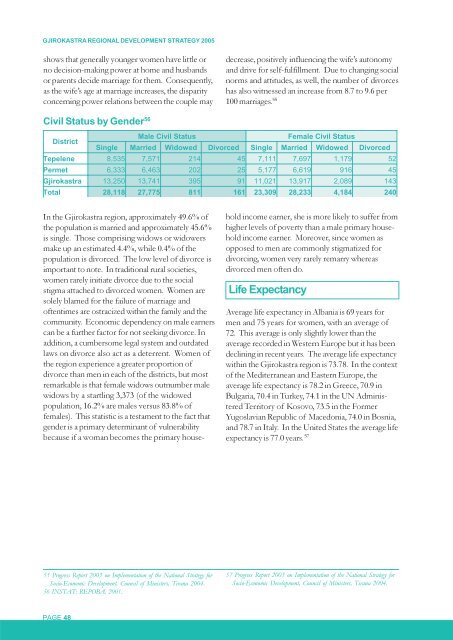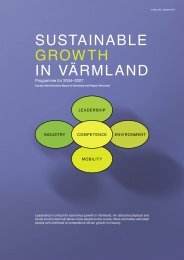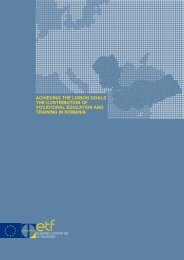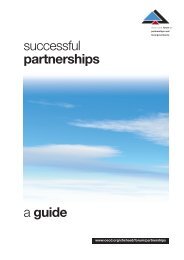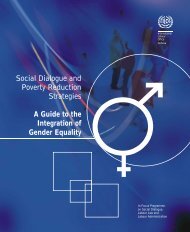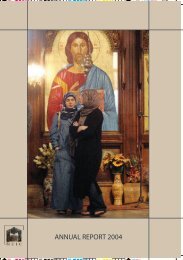PDF (18.5 MB) - Document Database website
PDF (18.5 MB) - Document Database website
PDF (18.5 MB) - Document Database website
Create successful ePaper yourself
Turn your PDF publications into a flip-book with our unique Google optimized e-Paper software.
GJIROKASTRA REGIONAL DEVELOPMENT STRATEGY 2005<br />
shows that generally younger women have little or<br />
no decision-making power at home and husbands<br />
or parents decide marriage for them. Consequently,<br />
as the wife’s age at marriage increases, the disparity<br />
concerning power relations between the couple may<br />
Civil Status by Gender 56<br />
District<br />
In the Gjirokastra region, approximately 49.6% of<br />
the population is married and approximately 45.6%<br />
is single. Those comprising widows or widowers<br />
make up an estimated 4.4%, while 0.4% of the<br />
population is divorced. The low level of divorce is<br />
important to note. In traditional rural societies,<br />
women rarely initiate divorce due to the social<br />
stigma attached to divorced women. Women are<br />
solely blamed for the failure of marriage and<br />
oftentimes are ostracized within the family and the<br />
community. Economic dependency on male earners<br />
can be a further factor for not seeking divorce. In<br />
addition, a cumbersome legal system and outdated<br />
laws on divorce also act as a deterrent. Women of<br />
the region experience a greater proportion of<br />
divorce than men in each of the districts, but most<br />
remarkable is that female widows outnumber male<br />
widows by a startling 3,373 (of the widowed<br />
population, 16.2% are males versus 83.8% of<br />
females). This statistic is a testament to the fact that<br />
gender is a primary determinant of vulnerability<br />
because if a woman becomes the primary house-<br />
PAGE 48<br />
decrease, positively influencing the wife’s autonomy<br />
and drive for self-fulfillment. Due to changing social<br />
norms and attitudes, as well, the number of divorces<br />
has also witnessed an increase from 8.7 to 9.6 per<br />
100 marriages. 55<br />
Male Civil Status Female Civil Status<br />
Single Married Widowed Divorced Single Married Widowed Divorced<br />
Tepelene 8,535 7,571 214 45 7,111 7,697 1,179 52<br />
Permet 6,333 6,463 202 25 5,177 6,619 916 45<br />
Gjirokastra 13,250 13,741 395 91 11,021 13,917 2,089 143<br />
Total 28,118 27,775 811 161 23,309 28,233 4,184 240<br />
55 Progress Report 2003 on Implementation of the National Strategy for<br />
Socio-Economic Development, Council of Ministers, Tirana 2004.<br />
56 INSTAT: REPOBA, 2001.<br />
hold income earner, she is more likely to suffer from<br />
higher levels of poverty than a male primary household<br />
income earner. Moreover, since women as<br />
opposed to men are commonly stigmatized for<br />
divorcing, women very rarely remarry whereas<br />
divorced men often do.<br />
Life Expectancy<br />
Average life expectancy in Albania is 69 years for<br />
men and 75 years for women, with an average of<br />
72. This average is only slightly lower than the<br />
average recorded in Western Europe but it has been<br />
declining in recent years. The average life expectancy<br />
within the Gjirokastra region is 73.78. In the context<br />
of the Mediterranean and Eastern Europe, the<br />
average life expectancy is 78.2 in Greece, 70.9 in<br />
Bulgaria, 70.4 in Turkey, 74.1 in the UN Administered<br />
Territory of Kosovo, 73.5 in the Former<br />
Yugoslavian Republic of Macedonia, 74.0 in Bosnia,<br />
and 78.7 in Italy. In the United States the average life<br />
expectancy is 77.0 years. 57<br />
57 Progress Report 2003 on Implementation of the National Strategy for<br />
Socio-Economic Development, Council of Ministers, Tirana 2004.


